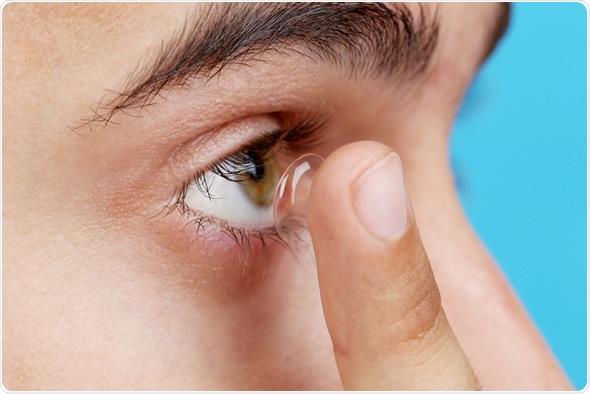Contact lenses are commonly used to correct vision as an alternative to glasses but their use can sometimes be accompanied by headaches if they do not fully compensate for vision problems or they do not fit the eyes properly.

Copyright: 5 second Studio, Image ID: 322411034 via Shutterstock
Why contact lenses are used
Vision problems are often due to a refractive error in a person’s vision. This is when light entering a person’s eyes through the outer cornea of the eye and through the lens does not focus on the retina but either converges before or after the retina.
Wearers may use the contact lenses to help correct astigmatism which impairs clarity in vision due to an uneven eye lens or cornea. Patients can use them to improve myopia when light focuses in front of the retina (near sightedness) or hyperopia when light focuses after the retina (far sightedness).
Some patients may also use bifocal or multifocal lenses to correct both long sightedness and short sightedness. Occasionally some people also wear coloured contact lenses for decorative purposes.
Why headaches occur
Refractive errors can cause several symptoms such as double vision, eye strain and squinting. They can also be a factor in headaches for people who wear contact lenses if they are wearing the wrong prescription.
Contact lens wearers may suffer from headaches due to different factors. One of the causes of headaches can be presbyopia, long-sightedness that develops as we get older because the lens in the eye loses its elasticity.
Our eyes find it more difficult to focus effectively on nearby objects with this condition from around the age of 40 and older. The muscles around the lens get weaker and find it more difficult to adapt to changes in focus. The symptoms include blurred vision at reading distance, tiredness and headaches.
Patients who develop presbyopia will need to see their optician to get a new prescription for their contact lenses to help correct the condition. They may have the option to wear bifocal contact lenses that are split into distant vision at eye level and near sight at the lower level.
People who wear toric contact lenses to compensate for astigmatism may also experience headaches due to fit. Toric lenses are usually made from silicone hydrogel or gas permeable materials. They have a curved surface designed to compensate for non-uniform curvature of the eye ball. Wearers have to make sure that the toric lens sits on the eye in a specific position.
The toric lenses might not be as effective as prescription glasses at adjusting vision. The contact lenses can move out of position affecting the vision which can then lead to eye strain. The patient will need to explore a better fitting toric lens with their optician.
Cosmetic contact lenses can cause problems if they have not been selected and initially fitted with the help of an optometrist to ensure that they are the correct prescription and to minimize the risk of refractive errors.
Contact lens wearers can also suffer from dry eyes, also known as keratoconjunctivitis sicca, when not enough tears are made in the tear ducts. Tears, which come from the tear ducts, produce a protective layer over eyes which help to keep them healthy. The film is created every time we blink.
This can also result in headaches. Patients may have other symptoms too such as burning, scratching, a feeling of grit in the eyes and blurring to name just a few. The incidence of dry eye has increased over the years for people aged between 16 and 75 years old. It is particularly experienced by older people in this range. Contact lens wearers can use eye drops to lubricate their eyes and alleviate the symptoms.
Prescription coloured lenses
There is also evidence that coloured contact lenses can help patients who are suffering from migraines and are sensitive to light. Exposure to fluorescent lights can have a negative impact on some patients.
Some colours can have a positive influence on the brain when a person is experiencing a headache so tinted contact lenses can help to alleviate the symptoms. The optometrist must first investigate which shade of lens can benefit the patient as a variety of colours are options. Patients can experience reduced risk of migraines with auras.
References
Further Reading
Last Updated: Jan 2, 2023